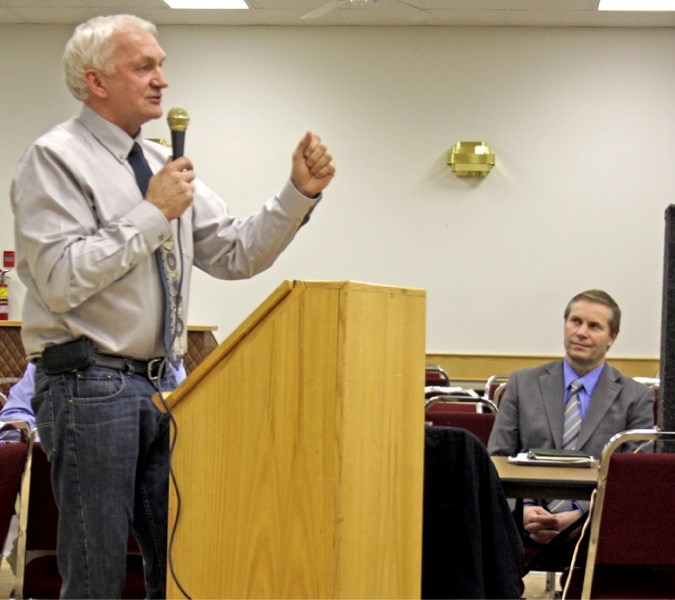The Wildrose Alliance is committed to addressing the issues facing Alberta’s farmers, and wants feedback on how best to do it, representatives of the party said at a public meeting last week.
The party’s Agricultural Task Force held a public consultation last Tuesday at the Memorial Hall in Westlock, where about 50 people came out to meet some of the candidates and MLA Paul Hinman. Danielle Smith was scheduled to attend but could not make it.
The concerns raised by those in attendance were mostly in line with policy directions the party has already identified: reducing the regulatory burden on producers, protecting personal property rights and decentralizing decision making.
“We need the regulatory burden wiped out. Government is the problem,” said Edward Goodliffe, one of the members of public at the meeting. “When you’ve got all this regulation over the grain and livestock and everything else, it is the problem.”
As an example, he said regulations are in place to prevent a farmer from simply selling meat to a neighbour because of the regulatory burden requiring the farmer to have the animal slaughtered at a provincially-inspected facility.
“We don’t need any of that. Fifty years ago you could have butchered your animals and sold them to your neighbours, and people weren’t dying wholesale, they were eating the best food possible.”
Danny Hozack, the party’s candidate for Vegreville-Wainwright, is a member of the agricultural task force and helped to set up the series of meetings across the province.
He made a presentation at the beginning of the night outlining the party’s general policy directions, and put an emphasis on empowering farmers.
“We think farmers are the best people to be stewards of the environment and what we need to do is have a general set of principles within which they’ll live and do their business,” he said. “Mostly the government just needs to stay out of it.”
The issue of decentralizing government power and increasing accountability came up several times throughout the meeting, in particular with respect to the idea of politicians being subject to recall if they start to go against the wishes of their constituents.
Paul Hinman, the MLA for Calgary-Glenmore, addressed the crowd when one audience member brought up the issue of a Class 2 landfill proposed for Thorhild County. Despite a vocal opposition to the project, that council is forging ahead with the project.
Hinman suggested a solution would be to have politicians subject to a recall, so that if enough of the electorate demanded it, they would be removed from office.
“When we pass the recall (legislation), it will affect every level of government,” under provincial jurisdiction, he said.
A second issue related to this concern is the idea that the locals who are most affected by this project are not being heard, Hinman said. This suggests a problem with centralized decision-making with respect to planning.
“Central planning, to us, is very wrong,” he said.
Not every issue the audience raised was in line with Wildrose Alliance policy, however. One audience member suggested multi-national corporations such as Monsanto have too much control over the province’s agricultural sector because they hold copyrights on certain genetic lines of seed, and force farmers to pay for those seeds year after year.
Hozack replied that the party believes strongly in property rights, and these property rights must extend to intellectual property such as canola breeds.
“They want to protect their property; their property is the genetics that they’ve developed,” he said. “We’re all free not to use their seed if we don’t want to.”
Despite this one exception, the audience seemed receptive to the ideas of the Wildrose Alliance, and the party’s representatives at the meeting seemed receptive to the audience’s suggestions and concerns.
Whether or not any of these concerns will be addressed and enshrined in party policy, however, will not be determined until after the annual general meeting, scheduled for May 17 this year.
Whether or not they will be given the opportunity to implement that policy, will be up to the province’s electors in the next provincial election, which is neither expected nor legally required until Spring 2012.



